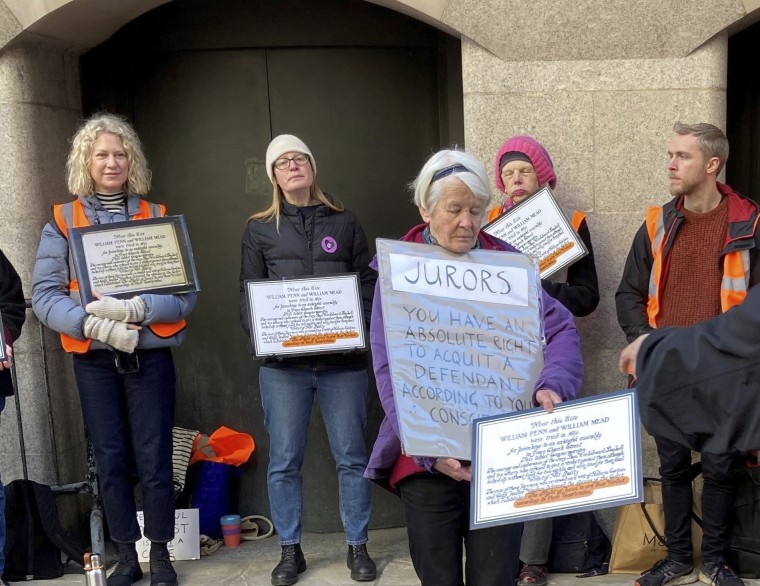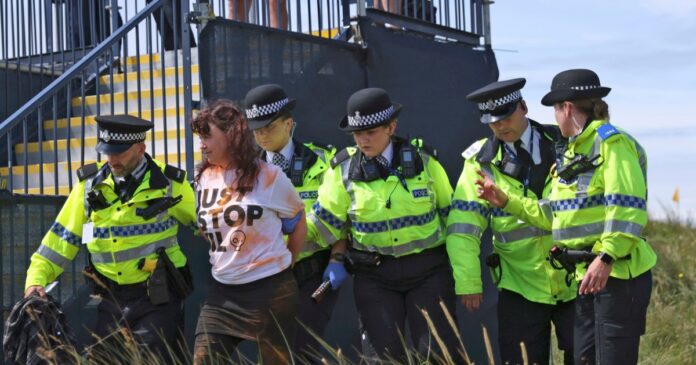In recent months the pace of protests and the scale of arrests has picked up, partly as a result of a legal tweak that criminalized slow walking, a tactic adopted by protesters to block traffic by marching at low speed along roads. Hundreds of Just Stop Oil activists have been detained by police within moments of starting to walk.
Some protesters have received prison sentences that have been called unduly punitive.
Structural engineer Morgan Trowland was one of two Just Stop Oil activists who scaled the Queen Elizabeth II Bridge over the River Thames near London in October 2022, forcing police to shut the highway below for 40 hours. He was sentenced to three years in prison for causing a public nuisance. Judge Shane Collery said the tough sentence was “both for the chaos you caused and to deter others from seeking to copy you.”
He was released early on Dec. 13, having spent a total of 14 months in custody.
Ian Fry, the United Nations’ rapporteur for climate change and human rights, wrote to the British government in August over the stiff sentences, calling the anti-protest law a “direct attack on the right to the freedom of peaceful assembly.” Michel Forst, the U.N. special rapporteur on environmental defenders, in October called the British laws “terrifying.”
The Conservative government has dismissed the criticism.
“Those who break the law should feel the full force of it,” Sunak said in response.
Even more worrying, some legal experts say, is the “justice lottery” facing arrested protesters. Half the environmentalists tried by juries have been acquitted after explaining their motivations, including nine women who smashed a bank’s windows with hammers and five activists who sprayed the Treasury with fake blood from a firehose.
But at some other trials, judges have banned defendants from mentioning climate change or their reasons for protesting. Several defendants who defied the orders have been jailed for contempt of court.
Tim Crosland, a former government lawyer turned environmental activist, said it’s “Kafkaesque if people are on trial and they’ve got a gag around their mouth.”
“That feels like something that happens in Russia or China, not here,” he said.
To highlight concern about such judges’ orders, retired social worker Trudi Warner sat outside Inner London Crown Court in March holding a sign reading “Jurors — You have an absolute right to acquit a defendant according to your conscience.” She was arrested and later informed by the solicitor-general that she would be prosecuted for contempt of court, which is punishable by up to two years in prison. Britain has strict contempt laws intended to protect jurors from interference.
Since then, hundreds more people have held similar signs outside courthouses to protest a charge they say undermines the foundations of trial by jury. Two dozen of the “Defend Our Juries” protesters have been interviewed by police, though so far no one apart from Warner has been charged.
Porritt said the aim is “to bring it to people’s attention that there is now this assault on the judicial process and on the rights of jurors to acquit according to their conscience.”

Is Brexit to Blame?
Many legal and constitutional experts say the treatment of protesters is just one symptom of an increasingly reckless attitude toward Britain’s democratic structures that has been fueled by Brexit.
Britain’s 2016 referendum on whether to leave the European Union was won by a populist “leave” campaign that promised to restore Parliament’s — and by extension the public’s — sovereignty and control over U.K. borders, money and laws.
The divorce brought to power Boris Johnson, who vowed to “get Brexit done,” but appeared unprepared for the complexities involved in unpicking decades of ties with the EU.
Johnson tested Britain’s unwritten constitution. When lawmakers blocked his attempts to leave the bloc without a divorce agreement, he suspended Parliament — until the U.K. Supreme Court ruled that illegal. He later proposed breaking international law by reneging on the U.K.’s exit treaty with the EU.
He also became enmeshed in personal scandals — from murky funding for his vacations and home decoration to lockdown-breaking parties during the pandemic. He was finally ousted from office by his own fed-up lawmakers in 2022, and later found to have lied to Parliament.
“People were elevated to high office (by Brexit) who then behaved in ways which were difficult to reconcile with maintenance of a stable democracy,” said Blick, the King’s College professor.
The populist instinct, if not the personal extravagance, has continued under Johnson’s Conservative successors as prime minister. In November, the U.K. Supreme Court ruled that a plan by Sunak to send asylum-seekers on a one-way trip to Rwanda was unlawful because the country is not a safe place for refugees. The government has responded with a plan to pass a law declaring Rwanda safe, regardless of what the court says.
The bill, which is currently before Parliament, has caused consternation among legal experts. Former Solicitor-General Edward Garnier said “changing the law to declare Rwanda a safe haven is rather like a bill which says that Parliament has decided that all dogs are cats.”
But Blick says Britain’s unwritten constitution means that checks and balances are easier to override than in some other democracies.
“Nothing can actually be deemed clearly to be unconstitutional,” he said. “So there’s no real blockage (on political power) other than that’s where you come back to self-restraint.”
A democratic deficit?
In Britain’s system, Parliament is meant to act as a bulwark against executive overreach. But in recent years, the government has given lawmakers less and less time to scrutinize legislation. Because the Conservative government has a large House of Commons majority, it can push bills through after perfunctory time for debate. Many laws are passed in skeleton form, with the detail filled in later through what’s known as secondary legislation, which does not receive the full parliamentary scrutiny given to a bill.
It increasingly falls to Parliament’s upper chamber, the House of Lords, to scrutinize and try to amend laws that the House of Commons has waved through. The Lords spent months this year trying to water down the anti-protest provisions in the Public Order Act. But ultimately the upper house can’t overrule the Commons. And as an unelected assortment of political appointees, a handful of judges and bishops and a smattering of hereditary nobles, it’s arguably not the height of 21st-century democracy.
“Of course the Lords is indefensible, but so is the Commons in its current form,” William Wallace, a Liberal Democrat member of the Lords, told a recent conference on Britain’s constitution. “The Commons has almost given up detailed scrutiny of government bills.”
Since Brexit, academics, politicians and others have been debating Britain’s democratic deficit in a series of meetings, conferences and reports. Proposed remedies include citizens’ assemblies, a new body to oversee the constitution and a higher bar for changing key laws. But none of that is on the immediate horizon — much less a written constitution.

The protesters, meanwhile, say they are fighting for democracy as well as the environment.
Sue Parfitt, an 81-year-old Anglican priest who has been arrested more times than she can remember as part of the group Christian Climate Action, has twice been acquitted of criminal charges. She, too, was interviewed by police after holding a sign outside court reminding jurors of their rights.
“It’s worth doing to keep the right to protest alive, quite apart from climate change,” she said.
“It would be difficult for me to get to prison at 81. But I’m prepared to go. … There is a sense in which going to prison is the ultimate statement you can make.”


